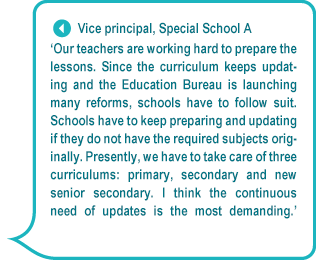QSIP: School Improvement for Special Schools (2012 – 2015)
As an extension of QSIP, the Quality School Improvement Project: School Improvement for Special Schools (QSIP-SIS) targets on providing school-based professional support for special schools to carry out comprehensive school improvement projects. Launching in 2012, we have provided one-year support divided in different phrases for 24 special schools in three years. On a school-based context, we aim for better school quality by assisting our subjects to scale new heights and develop learning and teaching in a sustainable manner, as a way to improve students' learning experience. We also help schools to fuel professional teaching energies and build a self-improving evidence-based mechanism to facilitate the sustainable development.
Development Needs of Special Schools
![]()
 Ordinary special schools serve intellectually-disabled and physically-disabled students aging from 6 to 8. Because of the lack of teaching manpower, it is not easy to plan a suitable learning journey across primary and secondary education for the SEN students. Besides, special schools need to pay more attention to the concept of ‘the same curriculum framework’ and various other curriculum reforms when designing the curriculum. Some special schools are striving hard to respond to the new education reforms. However, in our observation, contradictions do happen a lot among designing
Ordinary special schools serve intellectually-disabled and physically-disabled students aging from 6 to 8. Because of the lack of teaching manpower, it is not easy to plan a suitable learning journey across primary and secondary education for the SEN students. Besides, special schools need to pay more attention to the concept of ‘the same curriculum framework’ and various other curriculum reforms when designing the curriculum. Some special schools are striving hard to respond to the new education reforms. However, in our observation, contradictions do happen a lot among designing
and implementing the curriculum because of the lack of overall coordination.
![]()
Special schools team up students according to their degree of intellectual disability or physical disability, to allow students to receive education with peers of similar level. However, this is only theoretically practical. In reality, we observe a huge divergence on emotions, senses and cognitive styles within a class size of 5 to 8 students. A more ideal way to understand students sensitively and thoroughly is to tailor-make personalized teachings for individual student. Since teachers have different teaching styles and they seldom have deep exchanges between each other, their feelings are prone to frustration or helplessness at work, because of the inadequate support.
![]()

No different from mainstream schools, special schools face heavy workload. Educating students of serious physical disabilities combines teaching and nursing. Drenched in the hustle and bustle day by day, teachers seldom have time to reflect the development of the whole school. Teachers having oblique visions about the development of the school hold harmful of its long-term improvement. Because of it, we observe an assistance demand for the evaluation of the present situation, in order to inject new energy and build a self-improving mechanism for schools.
![]()
 With such internal limitations in the schools, educators of the special schools need to keep refreshing themselves and open an eye to new things. Inter-school professional exchanges and coordination are common means. Since every school is unique with different concerns, a rewarding exchange among schools requires an ‘agent’ to work as the bridge. It is also important to have proper platform or starting point of exchange and of course, the content of the exchange has to be in high quality.
With such internal limitations in the schools, educators of the special schools need to keep refreshing themselves and open an eye to new things. Inter-school professional exchanges and coordination are common means. Since every school is unique with different concerns, a rewarding exchange among schools requires an ‘agent’ to work as the bridge. It is also important to have proper platform or starting point of exchange and of course, the content of the exchange has to be in high quality.
Project Support Features

Project Support Modes
The project goes in line with other extensions of QSIP, we share the same core values and support modes. The following are some of our support features:
- We cater each school as an unique case and we believe that concrete school-based support actions should be taken after the evaluation of the present situation. We evaluate schools by interviews, questionnaires, class observations and school attachments, etc. in order to understand their needs and collect references (baseline data) for our further plans. Then, we work hand-in-hand with core groups of the schools to carry out such support actions.
- Our support is comprehensive, interactive and organic, and also flexibly assists our targets in an all-rounded manner. We refine schools environment, teaching subjects, classroom pedagogy and individual development. In such ways, we boost the internal motivations of schools for their own improvements. Speaking of bringing forth long-term transformations, we are confident that our support is more effective than other mechanical or stand-alone support projects.
- We trust the complimentary chemistry out of the interactions of our macro support (‘Big Wheel’) and micro support (‘Small Wheel’). ‘Big Wheel’ evaluates the present situation for schools to establish a self-improving system base on teamwork and creates a favorable culture. ‘Small Wheel’, on the other hand, carries out various trials for the focused development. It also enhances the teaching and learning performance as well as teachers’ proficiency. We aspire to introduce a stronger and more sustainable effect for schools under our duo support.
- We work hard to nurture teaching leadership, lift teachers’ proficiency and guide the transfer of knowledge and technology.
| List of Participating Schools |
| 2014-2015 |
|
| List of Participating Schools |
| 2013-2014 |
|
| List of Participating Schools |
| 2012-2013 |
|


